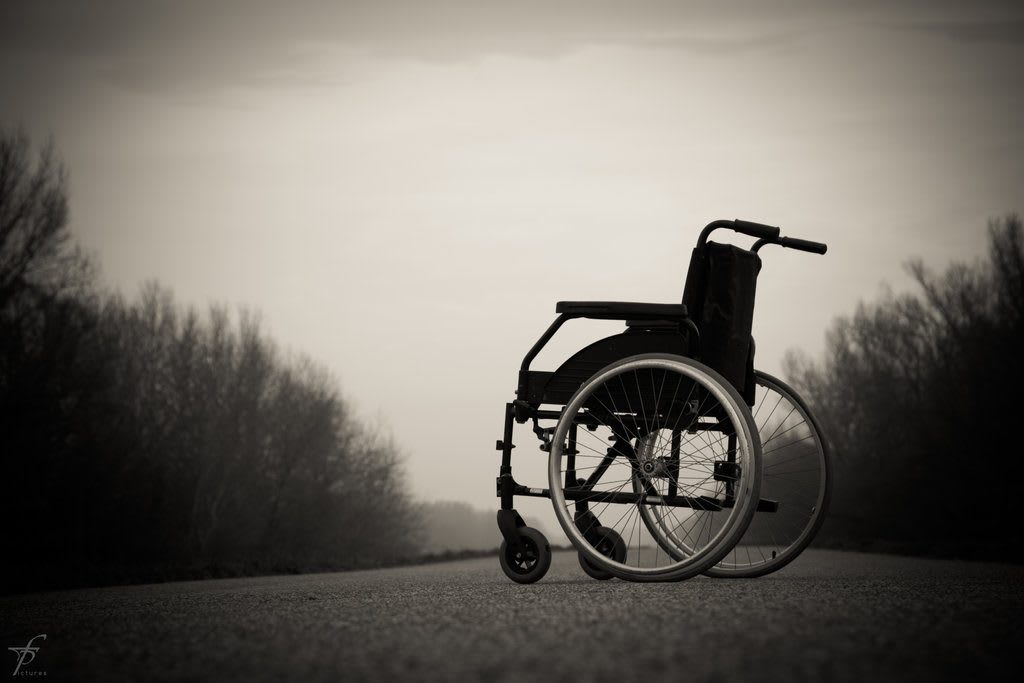10 Things Not to Say to a Person with a Disability
Because we're human too.

I’ve been disabled my entire life, but only in a wheelchair for 11 out of my 23 years on this Earth. And in those 23 years, I’ve had my fair share of insulting, back-handed statements and questions come my way. Although a lot of these statements and questions are said and asked with good intentions, the effect they have on those with a disability is usually negative. So, I compiled what you shouldn’t say into a list to educate those who need some enlightening on what not to say to a person with a disability.
1. “What is wrong with you?”
Honestly, you shouldn’t say this to anyone. There isn’t anything wrong with me… I just have a disability.
2. “I will pray for you.”
I appreciate the gesture because I know the person saying this just wants to help and really believes that prayer will work, but no act of God will cure my disability. Not even science can cure me (I know, that’s a little dark, but it’s true). I’m also not religious myself, so knowing that people are praying for me doesn’t give me hope (even if I still appreciate the intent).
3. “I hope you get better.”
Unfortunately, this isn’t the cold or the flu. I won’t get better, like a lot of others who also have a disability. Saying something like this implies that I need to get better, that I need to be able-bodied in order to fit into society, and that I even want to be able-bodied. I think this statement is a little ignorant and shows what people know about disabilities.
4. “Let me help you.”
Please don’t help someone with a disability without asking first! In most cases, we have certain ways of doing things that seem out of the norm but work for us. The world wasn’t built for us, so we’ve had to find strategies that help us do everyday tasks, and that may be in a way that could take a little longer than usual or may be different than how you do it. If you give us a few moments to work out whatever we are doing (e.g., opening a door, picking something up from the ground, paying at the cash register, etc.), a majority of the time you will see that we can do it on our own. And trust me when I say: if we need help, we will ask!
5. “You’re so brave!”
I still don’t understand why having a disability makes someone brave. We do everything you do, but in a wheelchair, with crutches, with a walker, etc. I don’t want to seem like I’m downplaying having a disability because it is definitely hard sometimes, but unlike a lot of the stereotypes, we don’t sit in our beds all day and wallow because we have a disability. Most of us were born with a disability, so we’ve become used to being different and doing things differently. So, completing day-to-day tasks is not brave of us, it’s normal.
6. “You’re an inspiration!”
This statement is very similar to the last one. Why am I an inspiration because I was born with a genetic abnormality? The only difference between you and me is that I have a disability and you don’t. Look at someone’s accomplishments in life—their degrees, their job, their hobbies, their creations, their family, their personality, etc. Don’t praise someone because they have a disability. This really diminishes and ignores all of their awesome achievements in life that they worked really hard for. Just imagine going to university for eight years to obtain an undergraduate degree and a master’s degree, while also working a part-time job and maintaining your relationships with your partner, family, and friends. Then, you land your dream job that just so happens to pay really well. Now, imagine after all of that all anyone ever praises you for is for having blue eyes—a genetic characteristic that you had no control over. Sucks, doesn’t it?
7. Don’t speak in baby-talk.
You wouldn’t speak to your 23-year-old friend, daughter, son, husband, wife, sister, brother, etc. like you would speak to a baby, would you? We can understand you loud and clear when you speak in a normal adult voice. It’s a really startling experience to be grown up and then spoken to as if you only know how to say “goo-goo” or “ga-ga.” It’s also really fun to shock people when you speak back to them like an intelligent, functioning human being. Who knew?!
8. Don’t give unsolicited advice.
This one is especially infuriating. I had a public bus driver exit the bus with me and for 15 minutes, he proceeded to tell me that I need to meditate in a dark room and envision myself walking; then, I will be cured. I didn’t ask him what he thought I should do in order to walk again. In fact, I’ve never asked someone that in my entire life. The only people who should be giving someone with a disability advice is a qualified doctor, not a bus driver, not a stranger on the street, not your great-aunt twice removed, no one. It’s actually quite insulting having someone tell you what you need to do in order to be magically cured when you never asked for the help. I asked this earlier: why do I need to be cured and able-bodied? Why do I need to fit into what society thinks I should look like? This expectation that people with disabilities need to mold themselves into what society thinks is normal is true ableism at its finest. 😊
9. “You’re so pretty for someone with a disability!”
Since when is it unacceptable to be pretty and have a disability? Just because we don’t fit the unrealistic beauty standards set by society doesn’t mean we aren’t beautiful. If you opened your eyes, you would see there is a whole other world of beauty that you’re missing.
10. Don’t ignore the person with a disability.
You’d think this was obvious, but I’ve had people speak to my significant other, my family members, and my friends instead of me when the situation was about me! I’ve had fast food workers completely ignore me when it was my turn to order, doctors speak to my significant other or family member because they think I wouldn’t understand what they were saying, and people I just met ask my friends why I’m in a wheelchair instead of asking me! When the situation is about the person with a disability, you should speak directly to them. And even if they are non-verbal and need to have someone speak for them, still respond directly to them. It’s human decency and will make them feel respected.
There are more things I could add to this list, but I think this is enough for now. The world has a lot of work to do to fix the ableism that is rampant in society and the conversation is just starting.






Comments
There are no comments for this story
Be the first to respond and start the conversation.